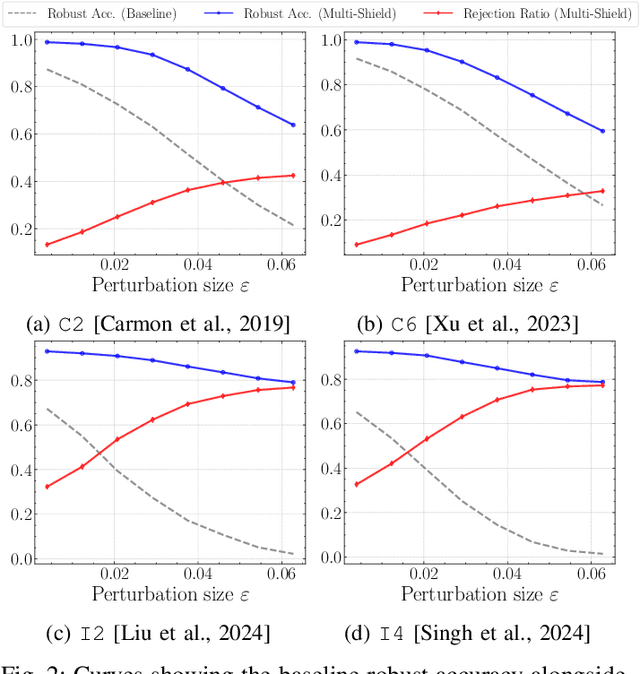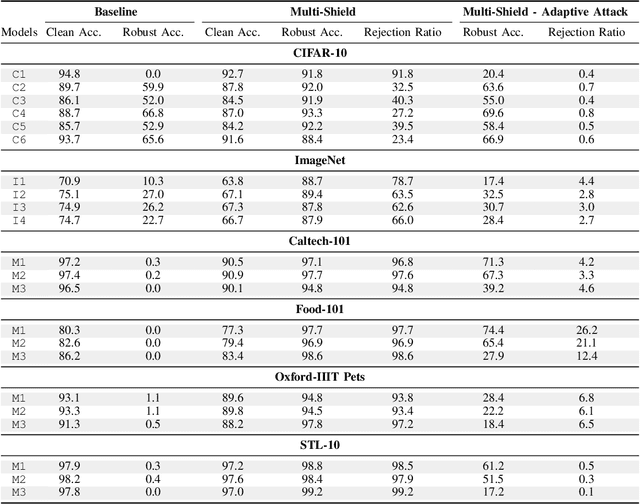Francesco Villani
Robust image classification with multi-modal large language models
Dec 13, 2024



Abstract:Deep Neural Networks are vulnerable to adversarial examples, i.e., carefully crafted input samples that can cause models to make incorrect predictions with high confidence. To mitigate these vulnerabilities, adversarial training and detection-based defenses have been proposed to strengthen models in advance. However, most of these approaches focus on a single data modality, overlooking the relationships between visual patterns and textual descriptions of the input. In this paper, we propose a novel defense, Multi-Shield, designed to combine and complement these defenses with multi-modal information to further enhance their robustness. Multi-Shield leverages multi-modal large language models to detect adversarial examples and abstain from uncertain classifications when there is no alignment between textual and visual representations of the input. Extensive evaluations on CIFAR-10 and ImageNet datasets, using robust and non-robust image classification models, demonstrate that Multi-Shield can be easily integrated to detect and reject adversarial examples, outperforming the original defenses.
Sonic: Fast and Transferable Data Poisoning on Clustering Algorithms
Aug 14, 2024



Abstract:Data poisoning attacks on clustering algorithms have received limited attention, with existing methods struggling to scale efficiently as dataset sizes and feature counts increase. These attacks typically require re-clustering the entire dataset multiple times to generate predictions and assess the attacker's objectives, significantly hindering their scalability. This paper addresses these limitations by proposing Sonic, a novel genetic data poisoning attack that leverages incremental and scalable clustering algorithms, e.g., FISHDBC, as surrogates to accelerate poisoning attacks against graph-based and density-based clustering methods, such as HDBSCAN. We empirically demonstrate the effectiveness and efficiency of Sonic in poisoning the target clustering algorithms. We then conduct a comprehensive analysis of the factors affecting the scalability and transferability of poisoning attacks against clustering algorithms, and we conclude by examining the robustness of hyperparameters in our attack strategy Sonic.
$σ$-zero: Gradient-based Optimization of $\ell_0$-norm Adversarial Examples
Feb 02, 2024Abstract:Evaluating the adversarial robustness of deep networks to gradient-based attacks is challenging. While most attacks consider $\ell_2$- and $\ell_\infty$-norm constraints to craft input perturbations, only a few investigate sparse $\ell_1$- and $\ell_0$-norm attacks. In particular, $\ell_0$-norm attacks remain the least studied due to the inherent complexity of optimizing over a non-convex and non-differentiable constraint. However, evaluating adversarial robustness under these attacks could reveal weaknesses otherwise left untested with more conventional $\ell_2$- and $\ell_\infty$-norm attacks. In this work, we propose a novel $\ell_0$-norm attack, called $\sigma$-zero, which leverages an ad hoc differentiable approximation of the $\ell_0$ norm to facilitate gradient-based optimization, and an adaptive projection operator to dynamically adjust the trade-off between loss minimization and perturbation sparsity. Extensive evaluations using MNIST, CIFAR10, and ImageNet datasets, involving robust and non-robust models, show that $\sigma$-zero finds minimum $\ell_0$-norm adversarial examples without requiring any time-consuming hyperparameter tuning, and that it outperforms all competing sparse attacks in terms of success rate, perturbation size, and scalability.
 Add to Chrome
Add to Chrome Add to Firefox
Add to Firefox Add to Edge
Add to Edge